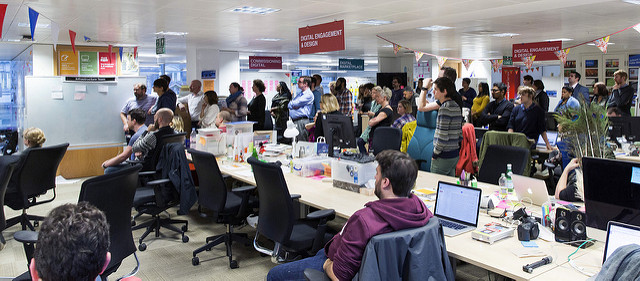
GDS is approaching its fifth birthday. It’s grown from a small organisation that delivered the prototype of GOV.UK in 12 weeks to one with responsibility for a number of transformation programmes, services, and standards. And it will continue to grow through the £450m investment government is making to help departments transform government.
Growth will always bring issues as organisations try to scale in a sustainable way, particularly when an organisation grows at the rate we have. Even without rapid growth, any large organisation will have issues and things it needs to improve. What’s important is that running any organisation shouldn’t be any different from building and running great public services. You always start with user needs, and then iterate, and iterate again.
How we’re improving
We’re aiming to bring together how we apply a digital way of thinking and our own design principles to make GDS a better place to work. The People Board have already taken the data from our most recent Civil Service People Survey and ran a number of workshops and one on one conversations to prioritise the areas for improvement.
These include:
- making it easier to know who does what, so work has clear ownership and it’s clearer how to get things done
- improving performance management so it provides an opportunity for feedback on progress towards personal development goals
- developing a stronger career offer, making it easier for individuals to develop within the organisation through visibility and fair access to different roles
This is in addition to some other changes we’re currently testing., For example, we’re expanding the role communities of practice have within the organisation and delegating more responsibility and operational decisions to teams.
We want GDS to be a great place to work and an exemplar organisation for the rest of the Civil Service. We’re not there yet but I hope that by sharing our learning (and mistakes) we’ll help other parts of the Civil Service improve too.
Join the conversation on Twitter and don't forget to sign up for email alerts.


4 comments
Comment by Kevin Carley posted on
As a user of universal job match I thoroughly agree with your comments. One of the most frustrating and poorly designed sites I've ever used
Comment by Craig Cockburn posted on
On the one hand you have "user needs, not government needs" but on the other you have a necessary compliance with the GDS standard even if this doesn't meet user needs. How do you reconcile the apparent contradiction?
Do you feel you are really agile with people and interactions over processes and tools or do you think the process is running the show? Do you feel that the velocity you have will be able to transition 95% of government UK services before your design style becomes obsolete? I'm looking at the universal job match service here which is the most used government service but looks like its escaped from 1995 and is a user experience disaster.
Where are you going to be when we have voice based browsing and I just open my phone and do this:
1. "hey Google tell me what I owe HMRC and when it is due"
2. Phone responds with an amount and due date, logging me in using the voice recognition software already used by HSBC
3. OK, please pay HMRC so they receive the full amount in time.
4. Phone responds "This has now been set up and a confirmation send so you can check the details
All of this technology is available now and would be more use friendly and easier for people who struggle with technology including the elderly, dyslexic, people without computers, the disabled. People only use websites because that's the model we started using 20 years ago. What is your vision for the future where we don't really need a gov.uk unless we need to see something in writing? What's your model for making interaction with government the exception - it shouldn't be digital by default it should be nothing by default and digital by exception
Craig (author of UK's first guide to getting online, ex Directgov)
Comment by David Alexander posted on
Great post and thanks for sharing the approach, echoes much of what we seek to do. I would however recommend thinking carefully about the word ownership, this is not always seen positively or understood culturally in EU as opposed the US.
I take it by ownership you mean having responsibility and accountability for an outcome, activities or results. Much more positive language and easier to define in SMART way everyone can understand and works better when trying to work in a collaborative environment where RACI matrix mindset may exist. We all must take responsibility and be accountable for our own actions and lives and this extends into the work we do. Owning something inspires and requires nothing more than putting it in a cupboard and potentially doing nothing with it or implying power and control beyond the scope of a remit or mandate
When driving complex change and evolution across diverse cultures adopting the sense of responsibility and accountability approach transformed engagement and understanding for all
Comment by Alex Holmes posted on
Thanks David, this is useful feedback